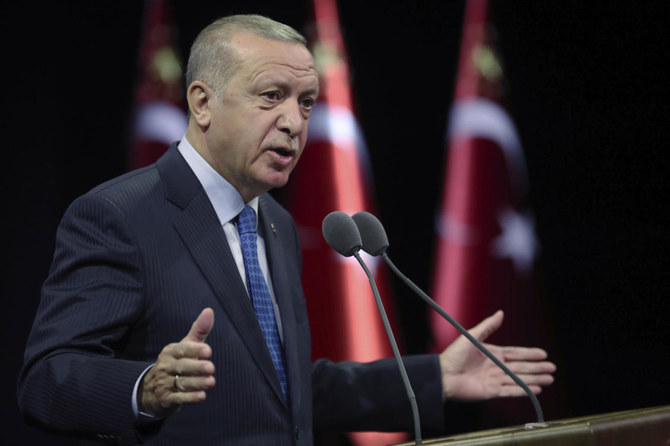ANKARA: Turkish President Recep Tayyip Erdogan issued new threats to Greece on Saturday as Turkish forces prepared to conduct military exercises in the Eastern Mediterranean amid tension over oil and gas rights.
The temperature has soared in the dispute between the two countries since Turkey deployed a research vessel and an escort of warships last month to disputed waters between Cyprus and the Greek islands of Kastellorizo and Crete. Greece and Cyprus claim the area as their exclusive economic zones.
“They will understand that Turkey has the political, economic and military strength to tear up immoral maps and documents,” Erdogan said on Saturday. “They will either understand the language of politics and diplomacy, or on the field through bitter experiences. Turkey and the Turkish people are ready for every possibility and every consequence.”
Turkish military forces will begin five days of military exercises on Sunday in the breakaway republic of northern Cyprus, which is recognized only by Ankara.
NATO said last week that Greek and Turkish leaders had agreed to take part in technical discussions to avoid accidents between their navies, but Greece said later it had not agreed to the talks.
The crisis has echoes of disputes between Turkey and Greece in 1974, 1987 and 1996, experts told Arab News. “There is clearly a chance for escalation, but these two countries also have a record of limiting the level of violence between them,” said Gallia Lindenstrauss, senior research fellow at the Institute for National Security Studies in Israel.
“It seems that the Greek side is still holding to its past positions and that Turkey is using this crisis for a larger agenda than just the legal dispute.”
Paul Antonopoulos, an expert on Turkish-Greek relations, said technical talks between Greece and Turkey were unlikely to produce results because of disagreements over conditions.
“As Turkey not only refuses to send its ships back to port, but has actually increased war and invasion rhetoric against Greece, discussions will not occur under these conditions,” he said. Antonopoulos thinks Turkey’s recent moves in the eastern Mediterranean, as well as in Syria, Iraq and Libya, have been motivated by a maximalist push for neo-Ottomanism.
“It is unsurprising that Turkey’s military interventions have all been in countries that are not only former Ottoman territories, but are energy-rich,” he said.
“When we look at Turkey’s military escalations wanting to control energy deposits and its flows to support the country’s growing population and economic progress, dialogue to resolve issues with Greece will not be fruitful.”
The Eastern Mediterranean was also a subject of talks between the UAE and Egyptian Foreign Ministers, Sheikh Abdullah bin Zayed Al-Nahyan and Sameh Shoukry.
Tanks moved toward border
Meanwhile, Turkish media reported that tanks were being moved towards the Greek border. The Cumhuriyet newspaper said 40 tanks were being transported from the Syrian border to Edirne in northwest Turkey and carried photographs of armored vehicles loaded on trucks.
A military official speaking on condition of anonymity in line with government regulations said the deployment was a regular movement of forces and unconnected to tension with Greece.
The president’s comments come after NATO said military officers from Greece and Turkey had begun technical discussions to reduce the risk of armed conflict or accidents.
The two NATO allies have been locked for weeks in a tense standoff in the eastern Mediterranean, where Turkey is prospecting the seabed for energy reserves in an area Greece claims as its own continental shelf.
Ankara says it has every right to prospect there and accuses Athens of trying to grab an unfair share of maritime resources.
Simulated dogfights between Greek and Turkish fighter pilots have multiplied over the Aegean Sea and the eastern Mediterranean. A Turkish and a Greek frigate collided last month, reportedly causing minor damage to the Turkish frigate but no injuries.
Erdogan said Turkey had repeatedly expressed its willingness to come to a just agreement.
“Our word is sincere,” he said. “The problem is those before us disregard our rights and try to situate themselves above us.”
Turkey faces a wide range of opponents in the eastern Mediterranean. France, Italy and the United Arab Emirates have all sent forces to join war games with either Greece or Cyprus in recent weeks. Egypt has signed an energy exploration deal with Athens for the Mediterranean.
The European Union, which counts Greece and Cyprus as members, has also threatened possible sanctions against Ankara over its “illegal” actions.
This week, the U.S. announced it was easing a 33-year-old arms embargo against ethnically divided Cyprus.
The island split in 1974 when Turkey invaded following a coup by supporters of union with Greece. Turkey is the only nation to recognize a Turkish Cypriot declaration of independence and it maintains more than 35,000 troops in northern Cyprus.
The recent crisis is the most serious in Turkish-Greek relations in decades. The neighbors have come to the brink of war three times since the mid-1970s, including once over maritime resources in the Aegean.
Earlier, Ankara announced joint military exercises with northern Cypriot forces from Sunday to Sept. 10. The air, land and sea drills are held every year.
(With AP)


























